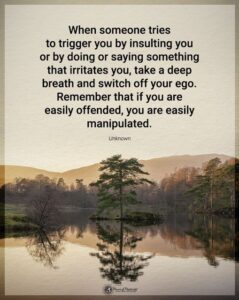We’ve all been there.
A car cuts you off. A friend says something insensitive. A relative criticizes you—again. Whether subtle or severe, these offenses can feel like tiny cuts that bleed into our day, affecting our mood, our mindset, and how we treat others.
But here’s a powerful truth: Taking offense is often a choice.
And how we respond to offenses—real or perceived—can shape the course of our emotional and spiritual health.
🌿 Why We Take Offense
Being easily offended isn’t just about sensitivity; it’s often a reflection of how we perceive ourselves and the world. At its core, it reveals:
-
Unresolved insecurities
-
Unmet emotional needs
-
Unhealed past wounds
-
Unrealistic expectations of others
When someone triggers us, we may assume the worst: “They meant to hurt me.” But more often than not, it’s not about us at all. That friend may have been distracted, the store clerk overwhelmed, the relative unaware. When we learn to separate intent from impact, we take the first step toward emotional maturity.
🧘♀️ What Being Easily Offended May Be Telling You
Here are a few honest questions to explore:
-
Do you find yourself expecting to be hurt or disrespected?
-
Do you often feel defensive or mistrustful?
-
Do you take things personally, even when they’re not directed at you?
Your answers might lead to a powerful realization: the “offense” is often a reflection of inner wounds rather than outer attacks.
🔄 Shifting the Mindset: From Victim to Victor
Staying in “victim mode” can feel justified—but it limits your freedom. It gives others control over your emotions. Forgiveness, grace, and second chances aren’t just kind—they’re liberating. They empower you to move forward with clarity and confidence.
Mantra: “It’s not about me.”
When we live by this mantra, we free ourselves from the exhausting need to read into every action, every word, every slight.
🧠 Practical Tools to Build Resilience
-
Pause Before Reacting: Give yourself a moment to breathe before responding. Count to ten. Step away if needed.
-
Name the Emotion: Are you truly angry—or is it shame, fear, or sadness in disguise?
-
Practice Mindfulness: Meditation, journaling, or simply paying attention to your breath can help you reset and respond thoughtfully.
-
Question the Assumption: Could this person mean well? Could it be a misunderstanding?
-
Use Positive Self-Talk: Reframe hurtful thoughts. “Maybe they’re having a bad day” instead of “They don’t respect me.”
📝 Journal Prompt:
What is one recurring situation where you tend to feel offended?
What could that reveal about your own expectations, needs, or past experiences?
🌟 Final Thoughts
Being less easily offended isn’t about being passive or ignoring wrongdoing—it’s about choosing your battles, managing your emotions, and letting your values lead instead of your wounds.
This journey takes awareness, practice, and a willingness to grow. At Discovery Coaching Group, we walk with you on that path—whether it’s toward greater emotional resilience, personal empowerment, or spiritual peace.
Remember: You are not a victim of your reactions. You are the author of your response.
